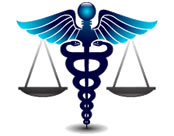

Medical Malpractice Connections

-
Surgical Negligence
- Adrenalectomy (Removal of Adrenal Gland)
- Adjustable Gastric Banding
- Appendectomy (removal of the appendix)
- Cholecystectomy (removal of gallbladder)
- Colectomy (colon resection)
- Common bile duct exploration
- Diagnostic Laparoscopy
- Enterectomy (small bowel resection)
- Enterolysis (removal of scar tissue in the abdomen)
- Esophagectomy (removal of esophagus)
- Fundoplication (surgery for heart burn)
- Gastrectomy (removal of the stomach)
- Gastric bypass
- Gastric Sleeve
- Hepatectomy (resection of portion of the liver)
- Hernia repair
- Hiatal Hernia Repair
- Pancreatectomy (removal of portion of the pancreas)
Colectomy (removal of the colon)
The condition
Numerous colon and rectal problems are treated by surgery. Problems related to Inflammatory Bowel Disease (such as Crohn's or Ulcerative Colitis), Familial Polyposis, Volvulus (twisting of the bowel), Endometriosis, Diverticular Disease and other benign and malignant diseases of the colon can be treated with open or minimally invasive surgery.
Symptoms:
The symptoms associated with benign and malignant colon disease vary widely but include the following:
- Blood in stool
- Abdominal distention
- Abdominal pain
- Thinned (pencil-like) stools
- Obstruction
Diagnosis
Several studies can help the doctor make decisions:
Endoscopy (video surveillance):
- Rule out cancer
- Evaluate for inflammation
- Diverticular disease
- Polyps
- Tissue biopsy
Barium enema:
- Rule out cancer
- Kinking or twisting of the colon
- Stenosis or blockage
The procedure
Laparoscopic colectomy is feasible for benign and malignant lesions. Rectal cancers that are more than 5 cm above the end of the rectum may also be resected (low anterior resection) with preservation of continence. Open surgical approach requires an 8-12 inches incision on the abdomen. The laparoscopic approach involves making four half-inch incisions on the abdomen through which a camera and three instruments are placed. The colon to be resected is mobilized. One of the port sites is enlarged slightly and the colon is removed. The principals applied in removing portions of the colon are similar for many different operations involving benign and malignant diseases. Procedures that may be performed laparoscopically include:
- Segmental colectomy
- Ascending colectomy (and ileocolectomy)
- Sigmoid colectomy
- Total abdominal colectomy
- Total proctocolectomy (whole colon and anus)
- Abdominoperineal resection (rectum and anus)
- Rectopexy (rectal prolapse)
Risks
- Wound infection
- Bleeding
- Perforation of the GI tract
- Splenic injury
- Post operative ileus (post operative intestinal paralysis)
- Bowel obstruction
- Disruption of colon connection (intestinal leak)
- Intra-abdominal abscess (infection)
- Ureteral injury
- Stricture of the colon connection
Medical Negligence
The above mentioned risks and complications are known to happen with colectomy (removal of the colon) and such complications do not necessarily constitute deviation from the medical standard of care. The following examples however may be considered as medical negligence.
- Disruption of colon connection (intestinal leak). Failure to diagnose and treat colon leak can lead fast to sepsis and death.
- Ureteral injury during colectomy may be the result of negligence, especially in the absence of colon inflammatory process (i.e. diverticulitis)
- Perforation of the GI tract that goes unrecognized can lead to major complications and death.
| Top of page |
| Home | Medical Malpractice Attorneys | Medical Experts | Medical Negligence | Services | Statue of Limitations | About Us | Contact Us |